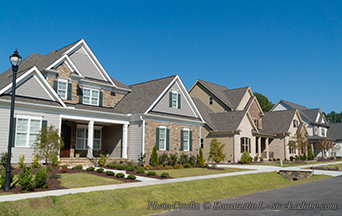
Homeowning used to be the goal of most families in search of stability. It was an essential component of the American Dream. However, the overheated market for houses now puts this dream out of reach for many Americans. As a result, some question the value of homeownership and opt for renting.
In his Bloomberg article, Prof. Karl W. Smith claims the shift to renting is nothing to fear. In the present climate, he says that it makes sense to become a nation of renters. By taking this position, he adopts a leftist approach by only looking at the economic reasons for abandoning real estate. He ignores the cultural significance of ownership and its social function.
The problem is not expensive property but the reasons why it has become so prohibitive. The frenetic intemperance of ever-rising housing prices should be addressed, not the changing of the institution.
The Liquidity Premium
Alas, Prof. Smith’s analysis reflects a tragic reality. He argues that housing has long been a very illiquid asset. It is not easy to convert into cash quickly. Thus, it does not have what economists call a liquidity premium that is attached to convertible assets like gold, publicly traded stocks or other investments.
Traditionally, houses were cumbersome assets that took time and effort to market. Their lack of a liquidity premium makes them cheaper. At the same time, illiquidity keeps housing prices stable. Houses tend to be good investments for moderate-income families since their value grows steadily over time. The relatively low single-house prices favor buying over renting. People could arrange mortgage payments comparable to rental rates. Most families were thus left with their most valuable asset.
The “Financialized” Housing Market
This situation changed in the early part of the century when instruments like sub-prime mortgages and automated appraisals “financialized” houses making them far more liquid and therefore more expensive. Mortgage-backed securities distributed the risk of lending to unworthy candidates and fueled a real estate boom that led to the 2008 sub-prime mortgage crash.
Help Remove Jesus Bath Mat on Amazon
The mechanism for liquidity, however, stayed in place. Gradually, housing has recovered its attraction for investors looking for a return on investment. As a result, prices have soared with a new “liquefaction” of the market.
This time the boom has not led to a rise in homeownership but more incentives to rent property.
New Factors to Overheated Prices
Many new factors have contributed to the rental option.
These include a shortage of housing stock in key areas of the country. The pent-up demand during the COVID crisis is now exploding onto the scene. Super-low interest rates contribute to home liquidity and make real estate attractive to investors willing to take risks, snapping up and flipping poor housing.
The market is distorted by institutional investors with the financial assets that allow them to expand and redevelop properties for rental. Thus, entire neighborhoods and developments devoted exclusively to renting are growing everywhere.
Prof. Smith claims that “The very features that made home buying an affordable and stable investment are coming to an end.”
And that it is not necessarily a bad thing, he argues.
A Liberating Situation
However, the slow but sure deterioration of homeownership is something to be lamented, not celebrated. However, liberals like Prof. Smith see the new situation as liberating.
Satanic Christ Porn-blasphemy at Walmart — Sign Petition
They claim that when it is cheaper to rent than to buy, individuals can explore more options. They are no longer tied to a particular place and are free to experiment without assuming responsibilities or commitments. There is no need for that sense of stability and continuity that comes from institutions like tradition, family and property.
When renting is legitimate and often necessary, a nation of renters would favor the “liberating” lifestyles that disconnect individuals from morality, stability, duty and dedication.
The Social Benefits of Homeownership
People forget that owning property bring social benefits for the individual, community and nation.
When people own property, they work harder to maintain their homes and families. It invigorates their soul and spirit to think beyond themselves. Property teaches people to think in terms of the future since it commits the people to stay in a place. People will improve the property that belongs to them and care less about that which is rented. Property is concrete proof of advancement and progress.
Homeownership links people to their communities, thus building a civil society oriented to the common good. When people own their houses, it creates an atmosphere of security and trust between neighbors. It allows places to develop their own character and traditions. Place becomes an important factor in people’s lives, adding a stability not found in nomadic renting.
Finally, owning property allows everyone to build capital and wealth. This process gives stability and continuity to families. It provides assets that people can use to increase their wealth and provide for their children. A climate of wealth-building benefits the nation. When there is no access to property, it is the quickest road to socialism.
How Panera’s Socialist Bread Ruined Company
Professor Smith laments that America is “not quite there yet” regarding embracing renting on a mass scale. “To see the U.S. as a nation of renters requires a revision of the American dream of homeownership.”
What America needs now is the opposite. If leaders want to revive America, they will need to create conditions for more homeownership, not less. They will need to stop the frenetic intemperance of frenzied house trading and bring sanity back to the markets. It will involve more than economic changes but the moral transformations that come from virtuous and committed living.
As seen on CNSNews.
Photo Credit: © Konstantin L – stock.adobe.com


